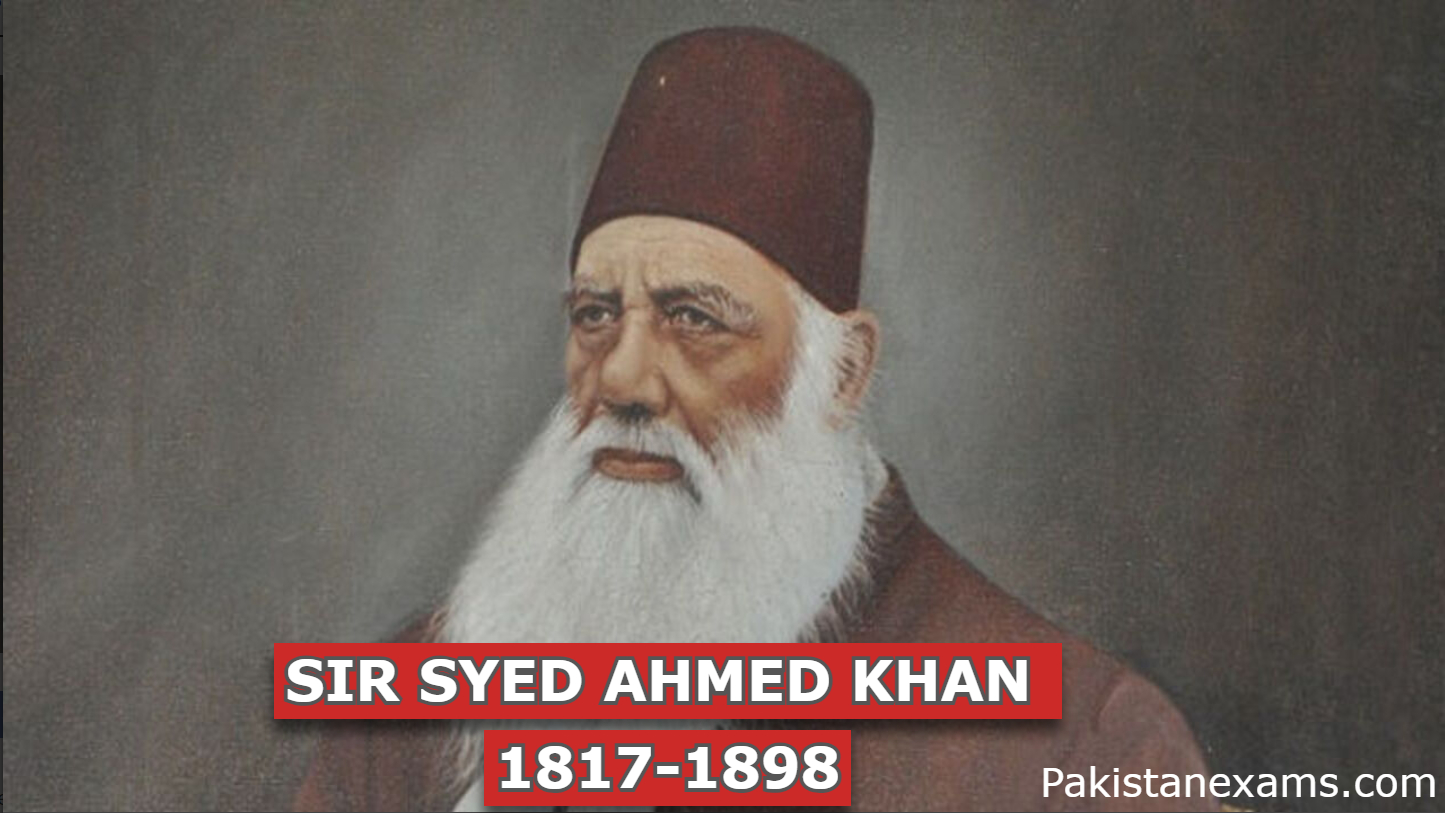Sir Syed Ahmad Khan opened his eyes on October 17, 1817. His parents were Mir Muhammad Muttaqi and Aziz un Nisa. Sir Syed Ahmad Khan married Mubarak Begum aka. Parsa Begum. Moreover, he had two sons. Syed Ahmad Khan died on March 27, 1898 at the age of 80.
After getting an early education, he joined the East India Company in 1835 as a sub-clerk in the Court of Law. Furthermore, in 1846 he was promoted to Chief Judge.
During the War of Independence (1857) he was in Bajnour where he saved British women and children putting himself at risk. In 1888, Sir Syed Ahmad Khan was raised to Knighthood. Sir Syed Ahmad Khan started the Aligarh Movement to help the Muslims in India.
Background of the Aligarh Movement
Post-1857 War, Muslims Considered a Reason for The Mutiny
Post-1857 War, Muslims considered a reason for the mutiny. Therefore, they were economically denigrated. They were also socially disrespected.
Hindus were also utilizing the opportunity for their gains. Sir Syed Ahmad Khan began his famous Aligarh Movement keeping in mind this situation of the Indian Muslims.
Literary Services of Sir Syed Ahmad
Syed Ahmad Khan wrote many books and magazines. His intention was to improve the lives of Muslims. The books of Sir are given below.
Risala Tehzib-ul-lkhlaq
In 1870, Sir Syed Ahmad Khan published a pamphlet, Risala Tehzib-ul-lkhlaq in which he described the social problems of the Muslims and also suggested their solutions. Moreover, he tried to eliminate the prejudice among the Muslims towards the Non-Muslims.
Reason for The 1857 Revolt
In this risala, Sir Syed Ahmad wrote the actual reasons that caused the revolt of 1857. Sir Syed Ahmad Khan explained that the Muslims were as much responsible for the war as were the Hindus and other nations. He also wrote that the Muslims were dragged into the war and that it was unworthy to blame the Muslims alone for the war.
Additionally, Syed Ahmad put the responsibility of war on the government. He declared that the dictatorial and oppressive policies of the government contributed a great deal toward the outbreak of the uprising against the government in 1857.
Tabbain-ul-Kalam by Sir Syed Ahmad Khan
Sir Syed Ahmad Khan wrote a commentary on the Bible called Tabbian-ul-Kalam. He wrote it in 1862 in Urdu.
Asar-us-Sanadeed
Asar-us-Sanadeed is famour literary work of Sir Syed Ahmad Khan. It focused on the social history of the Muslims. Moreover, it included the Muslim architecture.
Political Services of Sir Syed Ahmad
Hindi Urdu Controversy
In 1867, some Hindu leaders of Benaras thought that the use of Urdu as the official language should be discontinued. They also demanded to replace it by the Hindi language written in Devanagari script. These Hindu leaders organized an agitation against Urdu. This event is known as the Hindi-Urdu Controversy.
It was the moment when Sir Syed Ahmad Khan realized that the Muslims and the Hindus could not live in unity. Therefore, then he focused only on the Muslims and worked for their betterment.
Reconciliation Between Muslims and British by Syed Ahmad Khan
Sir Syed Ahmad Khan worked tirelessly to clear the misunderstanding between the British and the Muslims. In Loyal Muhammadans of India, he briefed the British about the services of Muslims for them. Additionally, he wrote Causes of the Indian Revolt. In this, he cleared that the policies of the British had caused the War of Independence in 1857. Thus, Sir Syed Ahmad Khan’s efforts helped the reconciliation between Muslims and the British.
Sir Syed Ahmad Khan: Father of Two Nation Theory
He was no doubt in favour of Hindu-Muslim unity in the beginning but after Urdu-Hindi Controversy he came to know the nature of the Hindus. Resultantly, Sir Syed Ahmad Khan used the concept of Two-Nation i.e. one nation Muslims and the other Hindus.
Based on the Two Nation Theory, he asked for special safeguards for Muslims in various occasions. Hence, he is the father of the Two-Nation Theory.
Created Future Leaders like Liaquat Ali Khan, and Abul Kalam Azad
Muslim leaders like Liaquat Ali Khan and Abul Kalam Azad were greatly inspired by Sir Syed Ahmad Khan. His work was always an inspiration for them.
Sir Syed Ahmad Khan Opposed Congress
Initially, the Indian National Congress (INC) was established to be the political party for the Indians. However, later on, it was used only for the benefit of Hindus. Therefore, Sir Syed Ahmad Khan wanted the Muslims to stay away from INC. He believed that INC was a Hindu party and it would only work for the interests of Hindus.
AMED as a Precursor to AIML
Syed Ahmad established the Anglo-Muhammadan Educational Conference in 1886. The Conference held public meetings in various parts of the country. This conference was used for discussing modern techniques for development in the field of education and suggested means for the improvement of educational standards.
In Addition, prominent leaders like Maulana Shibli, Nawab Mohsin-ul-Mulk, Nawab Viqar ul Mulk, etc. were included in the conference. Anglo-Muhammadan Educational Conference rendered valuable services by inspiring people spiritually and politically. Soon this conference was used to discuss political matters of Muslims. All India Muslim League came into existence in the annual meeting of the Anglo-Muhammadan Educational Conference (AMED) in 1906. Therefore, AMED is the precursor of All-India Muslim League.
Educational Services of Sir Syed Ahmad Khan
Schools and Scientific Society by Sir Syed Ahmad Khan
Sir Syed Ahmad Khan established the Gulshan School in Muradabad in 1859. This school taught children Persian and English. Sir Syed Ahmad Khan also established the Victoria School in Ghazipur in 1862.
Furthermore, in 1864, he established a Scientific Society. It was established at Ghazipur. The Headquarters of this society was shifted to Aligarh in 1876. The purpose of its establishment was to acquire books in other languages and translate them into Persian and Urdu to make them easier for people to understand. Sir Syed Ahmad Khan stressed the need for education in the English language so that the Muslim generation could learn Western modern knowledge as soon as possible.
Muhammadan Anglo-Oriental College by Sir Syed Ahmad Khani
MAO school was established on 24th May 1875. Due to this, Sir Syed’s movement is called the Aligarh Movement.
In 1877, Sir Syed Ahmad Khan established Muhammadan Anglo-Oriental College at Aligarh. It was the monumental achievement of Sir Syed Ahmad Khan concerning the educational services for the Muslims of India. It was inaugurated by Lord Lytton (viceroy of India). The college was open to Muslim and non-Muslim students.
Aligarh University in 1920
MAO College was upgraded to the status of a university in 1920 into Aligarh Muslim University. It was the first Muslim University in India. The Simla Deputation of 1906, demanded a Muslim university. Their demand was fulfilled in 1920.
Sir Syed Ahmad Khan Promoted Urdu
On various occasions like Urdu Hindi Controversy, Sir Syed Ahmad Khan came forward and defended Urdu. He promoted Urdu using the platform of the Scientific Society by translating renowned writings from other languages.
Father of the Two Nation Theory and the Aligarh Movement, Sir Syed Ahmad Khan, was the greatest Muslim educationist of India. Although, many people criticize him, he was a person of great vision. His vision was to improve the lives of Muslims through education. Indeed the educated youth of India played a key role in Pakistan Movement.


5 thoughts on “Sir Syed Ahmad Khan: The Greatest Muslim Educationist in India”